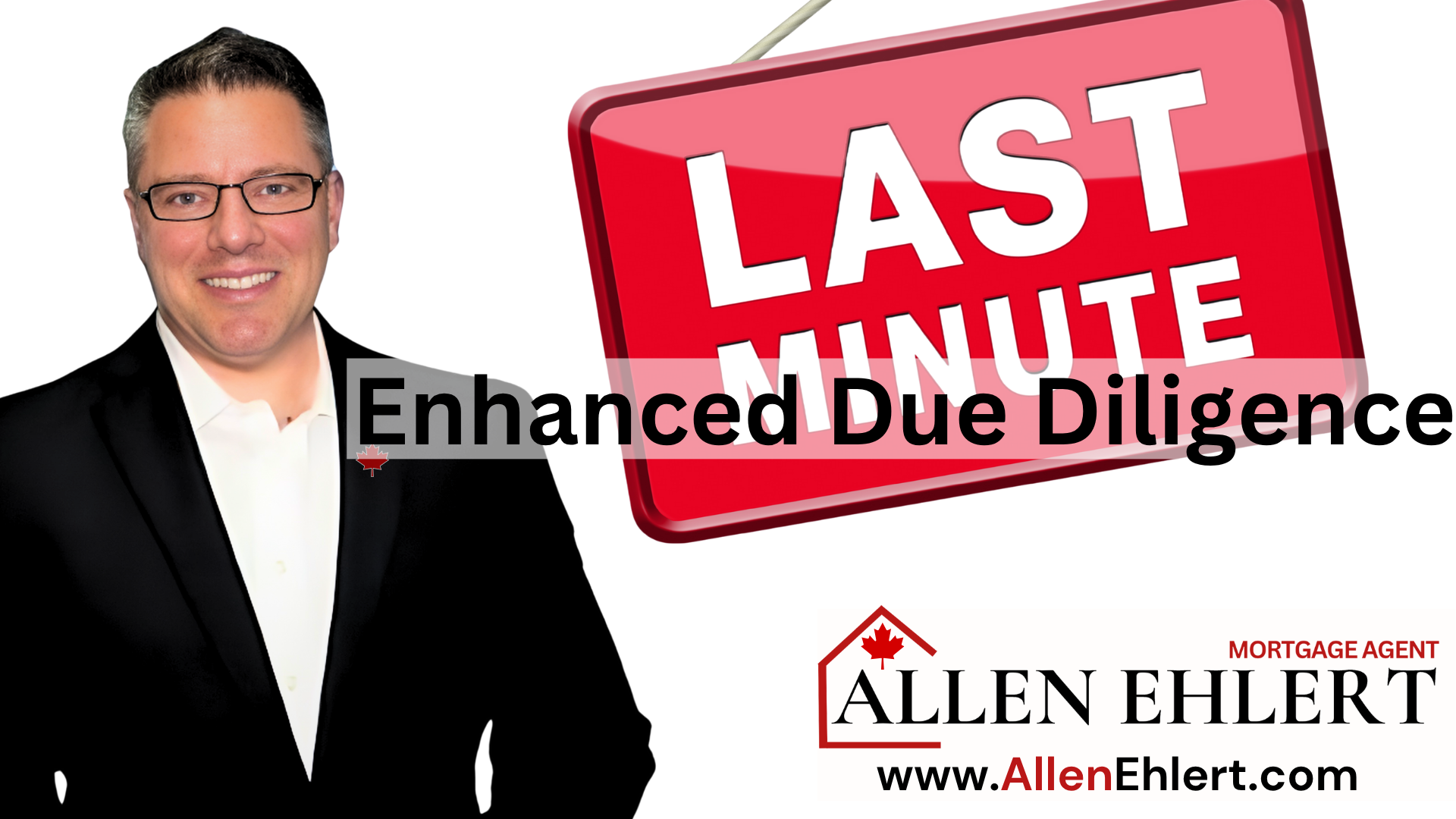… What EDD Means and Why It Matters
You’ve probably heard the phrase “the devil’s in the details”—and in the mortgage world, that detail often shows up as something called EDD, or Enhanced Due Diligence. It sounds intimidating, almost like you’re being audited, but it’s not what most people think. Whether you’re a first-time buyer, refinancing your home, or a realtor trying to help your client, understanding EDD can save time, stress, and even rescue a deal from hitting a wall.
Topics I’ll Cover
Why Lenders Use Enhanced Due Diligence
When Do Bank Underwriters Perform EDD?
A Real-World Story of EDD in Action
How Realtors and Clients Can Use This Knowledge
What Is EDD, Really?
EDD stands for Enhanced Due Diligence. In plain English, it means the lender is taking a closer look at your financial situation to make sure everything checks out. Think of it as a “deep dive” instead of a quick glance. It’s often connected to Canada’s Anti-Money Laundering (AML) and Anti-Terrorist Financing rules, but it’s also just smart risk management for the lender.
If your file is simple—T4 income, steady job, down payment saved from your own account—it usually sails through without EDD. But if something looks unusual, the lender might want to know more before stamping their approval.
Why Lenders Use Enhanced Due Diligence
Lenders don’t do this to make your life difficult. They do it to:
- Make sure the money being used for a down payment is legitimate.
- Confirm that income sources are stable and verifiable.
- Protect themselves (and you) from fraud and financial risk.
It’s not personal. It’s about making sure every “i” is dotted and every “t” is crossed so the deal doesn’t come back to bite anyone later.
Situations That Trigger EDD
EDD is often triggered when something on the mortgage file raises an eyebrow, like:
- Large, unexplained deposits into a bank account.
- Down payments coming from overseas.
- Complex self-employed income that’s tough to track.
- A client listed as a Politically Exposed Person (PEP).
- An unusual property or private lending situation.
A Real-World Story of EDD in Action
Meet Alex, a client of mine who wanted to buy a townhouse. Alex had a great job and solid credit, but his down payment was a patchwork of savings, a gift from family overseas, and the sale of a classic car. When the lender reviewed his file, they said, “We’re going to need to do Enhanced Due Diligence.”
What did that mean? It meant more paperwork:
- A bill of sale for the car.
- A letter confirming the gift funds and proof they came from family.
- Three months of bank statements to trace the deposits.
It took a bit longer, but Alex got the mortgage, and he got the home he wanted. Because we knew what the lender would ask for, we prepared everything in advance and kept the process smooth.
Great question—and it’s one that clients, realtors, and even some mortgage professionals don’t always see coming.
When Do Bank Underwriters Perform EDD?
Enhanced Due Diligence (EDD) isn’t tied to a single point in the mortgage process. Instead, it can happen at any stage when something about the file triggers additional review. That said, there are two main timing points:
1. At the Time of Underwriting (Initial Review)
- Most EDD is triggered early, when the underwriter first reviews income, down payment, and credit.
- This is the best-case scenario because there’s time to gather documents and explanations without jeopardizing the closing timeline.
- If a mortgage agent (like me) anticipates potential EDD triggers and preps documentation early, it often doesn’t slow things down.
2. Before Closing (Final Compliance Review)
- Some lenders (especially the Big 5 banks) do a final audit just before funding the mortgage.
- This is when last-minute EDD sometimes pops up—often because:
- A large deposit hit the account after approval.
- There’s a mismatch in employment or income at funding.
- A new piece of information (like a credit change) appears.
This last-minute EDD is where stress really hits because buyers are days (or even hours) away from closing and suddenly need to scramble for extra documentation.
Does It Cause Stress for the Buyer?
Absolutely. Buyers often feel blindsided:
“Why are they asking me about this now? I thought I was already approved!”
The truth is:
- The approval is always conditional until the mortgage funds.
- Lenders have a compliance responsibility right up to closing.
- If money laundering, fraud, or unusual deposit issues pop up at the last minute, they can’t ignore it.
How to Minimize Buyer Stress
This is where a proactive mortgage agent changes the game:
- Ask early about down payment sources and unusual income.
- Collect 90-day bank history upfront, not at the last minute.
- Document gift funds, sales, or transfers immediately.
- Communicate clearly to clients and realtors: “Even after approval, the lender might check again before closing, so keep everything consistent and don’t move large sums of money without letting us know.”
Bottom Line
EDD is normal and part of a lender’s risk and compliance duties, but it can feel like the rug is being pulled out from under buyers if it’s done late. That’s why anticipation and early documentation are critical.
How Realtors and Clients Can Use This Knowledge
For Realtors:
You can prepare clients early by asking about their down payment source and how their income is structured. If you hear “gift from overseas” or “self-employed with variable income,” you can give them the heads-up: “Your lender might need extra documentation, so let’s start gathering it now.”
For Clients:
Be ready to provide proof of how you got your down payment and where your income comes from. If you’ve got large deposits, be prepared to explain them—receipts, contracts, or even letters of explanation can do the trick. The earlier you have these, the less stressful the approval process will be.
Allen’s Final Thoughts
EDD might sound like an interrogation, but really it’s just lenders doing their homework. It’s about making sure your money is clean, your income is solid, and the whole deal is on firm footing. If you know it’s coming, it’s not scary—it’s just paperwork.
How I Can Help
This is where I come in. I can:
- Spot potential EDD triggers before your file goes to the lender.
- Give you checklists so you know exactly what documents to prepare.
- Work directly with the lender to explain your unique situation clearly.
- Keep your realtor in the loop so there are no surprises at closing.
Bottom line: I’m here to make sure EDD doesn’t delay your deal—or worse, kill it. Whether you’re buying your first home, moving up, or refinancing, I’ll help you navigate the “extra eyes” process so you can focus on what really matters: getting the keys in your hand.










